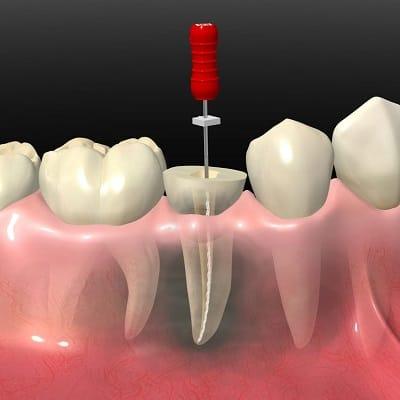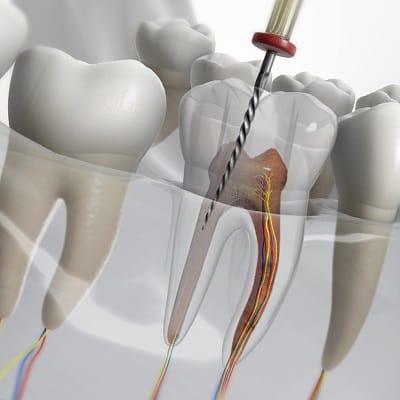Many people struggle with halitosis, or persistent bad breath. Poor dental hygiene, gum disease, and especially tooth infections may cause this illness. People sometimes wonder if a root canal will improve their bad breath. Despite relieving pain and preventing illness, this practice may surprise you with its effect on bad breath. If root surgery was performed to treat a dental infection, bad breath could be improved.
This article examines the relationship between root canals and bad breath, specifically if they can alleviate halitosis.
Is Root Canal Pain Normal?
Patients often experience discomfort, stinging, or minor pain for a few days after a root canal procedure. The nerves around the damaged tooth may be swollen or irritated, causing daytime discomfort, especially when eating. Root canal therapy also requires your oral surgeon to use sharp instruments near your gums, which may damage adjacent tissue.
Your dentist may recommend over-the-counter pain medicine on painful days, but keep the pain to a minimal level. However, significant discomfort between the weeks after therapy is abnormal and usually indicates an infection.
What Can Cause Bad Breath?
Oral germs are a major cause of bad breath. These bacteria reduce food waste and produce foul-smelling sulphur compounds. Poor oral wellness, receding gums, or dry mouth can promote germ proliferation and chronic halitosis.
Root Canal Infection Treatment
After detecting root canal infection symptoms, seek treatment. If your tooth becomes infected again, most dentists will prescribe a root canal in the process of retreatment.
- An x-ray will help the dentist find dead or diseased tissue near the middle of the root canal. This is identical to your previous root canal procedure.
- The area should be numbed using local anaesthesia.
- Protect your teeth with a barrier to keep your mouth and gums healthy.
- The tooth’s pulp and channels are accessed by drilling the tooth.
- After drying, fill the region with latex-based gutta-percha polymer.
- Use composite or amalgam fillings to protect the teeth. Leave and rest.
What happens during a root canal?
The dental professional or endodontist will take dental X-rays of the troublesome tooth before treatment. They may examine your tooth pulp for inflammation, infection, or death in addition to establishing that you need a root canal. They may be capable of:
The root canal treatment process includes:
- The medicine may cause sleepiness, so you cannot drive after treatment.
- A small, flexible rubber piece will be applied to your impacted tooth and nearby gums by your healthcare practitioner. This dentistry dam will keep your teeth dry throughout treatment.
- They will drill a tiny hole in your tooth crown to reach the pulp.
- After that, they will use little dental instruments to remove your tooth pulp’s nerves, blood vessels, and tissues.
- After removing your pulp, your dentist will clean and disinfect both the pulp area and root canals.
- Next, they fill the root channels and empty the pulp chamber with gutta-percha, a rubbery dental material.
- Your dentist will then reinforce your tooth with a temporary filling. The seal prevents bacteria from entering and prevents tooth decay.
The final step is for your dentist to place a crown on the treated tooth. Dental crowns restore your bite and protect teeth. Because they are made to order, this final step can take two to three weeks.
What Happens After a Root Canal?
You may be advised to rest for a few moments after leaving the dentist’s or provider’s office. It may take an hour during anaesthesia to wear off, restoring gum and mouth sensation. Some people stay home and recuperate, while others resume their daily routine. In most circumstances, you will need two more appointments for a dentist to prepare and place a crown.
What are The Benefits of Root Canal Treatment?
Root canal operations can enhance dental health and quality of life over time. After a lengthy period, a diseased tooth may need to be extracted. To cover the gap, you’ll require an implant in a bridge, which is expensive. Natural teeth that have been restored require less maintenance than implants or bridges.
Additional benefits of root canal treatment include:
- Hinders infection spread
- Root canal therapy removes infection-causing germs, keeping the infection from spreading to the jawbone, soft tissues, and facial gaps. After removing the diseased pulp, the root canal undergoes disinfection and cleaning to prevent tooth decay.
- More effective chewing
- Tooth abscesses can cause chewing pain and swelling. After a root canal, a filling or crown is fixed on the tooth, making biting, digging, and smiling easier.
- Pleasant visual effects
- A dentist will fill or crown your teeth after root canal therapy to give your smile a natural look.
What is The Cost of Root Canal in Islamabad?
Dental root canal therapy and collaboration costs vary for many reasons. The case’s difficulty, the number of damaged teeth, and additional procedures are considered. With simplified pricing, Enfield Royal Clinics offers affordable dental care without compromising quality. Our knowledgeable staff will explain the fees during your consultation, providing transparency and clarity.
Book Your Consultation!
Enfield Royal Clinics makes scheduling a consultation easy. You can make an appointment online, by calling or emailing our clinic, or by visiting our clinic. Our friendly staff will help you find a comfortable appointment time and walk you through the process. We can help you improve your oral health and confidence, whether you have foul breath or need basic dental treatment.






Leave a Reply